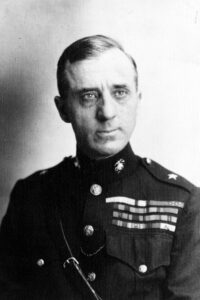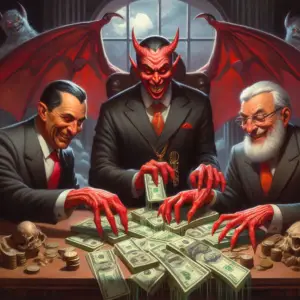Understanding the control of money is crucial to comprehending the intrigues of these elite power groups.
This brings us to the Federal Reserve System and the banking establishment.
The control of money and financial institutions plays a central role in the activities and influence of the Bilderberg, CFR, and Trilateral Commission circles.
By examining how these organizations manipulate monetary policy and banking systems, we can uncover the underlying mechanisms that enable their dominance in global affairs.
The intricate web of financial power extends beyond national borders, impacting economies and shaping the geopolitical landscape.
The Critical Role of Money Control
Understanding the control of money is critical to grasping the intrigue of elite power groups like the Bilderberg, CFR, and Trilateral Commission.
This brings us to the matter of the Federal Reserve System and the banking establishment.
Most readers of this post will likely be familiar with the works of the great late, Eustace Mullins, the premier populist historian of the 20th Century.
Although Eustace’s writings are not “mainstream”—at least in the view of the power elite—his book, The Secrets of the Federal Reserve, is essential for understanding the nature of the predatory plutocratic pyramid of power that dominates the American economy and, perhaps, the whole world.
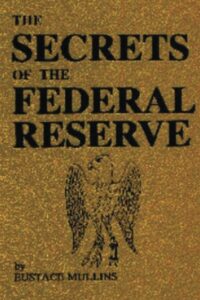
This pivotal work has been mimicked, parroted, copied, and plagiarized by many but equaled by none.
However, there are other important works, lesser-known but equally significant, that have arisen from the independent dissident movement in America.
One such book is the late Father Charles Coughlin’s Money: Questions & Answers.
The famed “radio priest” of the 1930s, Coughlin was an outspoken critic of the Federal Reserve System and the corrupt Roosevelt administration and its drive for war against Germany.
Coughlin’s chief preoccupation was economics, and he recognized the immense power of money control.
Making Money Matters Accessible
That’s why Coughlin’s book is important. Set up as a series of simple questions and answers about the subject of money, it serves as a fantastic guide that unlocks the mysteries surrounding this often opaque topic.
Coughlin’s work removes not just the mystery but also the tedium, making the subject accessible to the average person who, like me, might not be schooled in economics or the esoteric intricacies of finance.
Wright Patman’s Primer on Money
A similarly valuable work is A Primer of Money, issued under the auspices of former Rep. Wright Patman (D-Texas), a genuine populist.
Patman dedicated much of his congressional career to fighting the Federal Reserve System and exposing its hidden machinations to public scrutiny.
This primer is an important work that has been largely forgotten by modern critics of the Fed. For those needing a solid introduction to the topic, this book is a true primer, as its name implies.
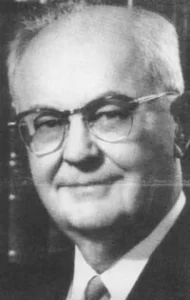
Mainstream Exposé on Banking Corruption
Despite the dominance of the Establishment Media, there are numerous works that delve into banking corruption.
One such mainstream book is Penny Lernoux’s In Banks We Trust: Bankers and Their Close Associates: The CIA, the Mafia, Drug Traders, Dictators, Politicians, and the Vatican (Anchor Books, 1984).
Although written by a mainstream author, this book is a “conspiracy theorist’s dream.” It uncovers the often-bizarre and criminal activities of well-known and lesser-known banks in the United States and abroad.
As the title suggests, it highlights the interactions of banks with a colorful assortment of individuals and interests.
Though somewhat dated, this book serves as a virtual catalog of notable figures and their misdeeds under the guise of respectable banking enterprises.
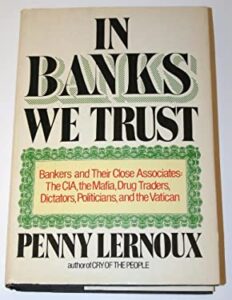
Pete Brewton’s Exposé on Savings and Loan Scandals
Another notable work covering similar ground, but focused primarily on the savings and loan scandals that rocked America in the 1980s, is Pete Brewton’s The Mafia, CIA, and George Bush (SPI Books, 1992).
Published during the senior Bush’s reelection campaign, the title might seem misleading, suggesting a focus on Bush alone.
However, the book is much more broad-ranging, delving into the extraordinary interactions between publicly renowned bankers, politicians, and other prominent figures with elements of the crime syndicate and intelligence agencies.
This exposé will likely shock the more naive readers, revealing the sordid connections between respectable individuals and nefarious activities.
However, it does have one notable flaw: Brewton avoids mentioning what was arguably the biggest secret of the savings and loan scandal—that much of the misappropriated money was channeled offshore into bank accounts controlled by assets of Israel’s Mossad and diverted to Israel’s super-secret nuclear weapons development program.
This aspect was exclusively reported by my late colleague, Andrew St. George, in The Spotlight.
It’s worth noting that the omission in Brewton’s book might be influenced by the fact that SPI Books, the publisher, is a subsidiary of an Israeli-based publishing firm.
Despite this, the book remains quite instructive and offers valuable insights into the intricate web of corruption involving savings and loan institutions.
The “Future Fast Forward” Trilogy by Matthias Chang
As far as the intrigue of the international banking elite is concerned, one cannot overlook the famous “Future Fast Forward” trilogy by Matthias Chang.
These books were first published in Malaysia and later released in their first American editions by my publisher, American Free Press. The trilogy includes:
- Future Fast Forward: The Zionist-Anglo-American Empire Meltdown
- Brainwashed for War, Programmed to Kill
- The Shadow Money Lenders and the Global Financial Tsunami
An Insider’s View of World Power Politics
These volumes offer a remarkable insider’s view of world power politics from a perspective rarely heard by Americans.
Chang, the grandchild of Chinese immigrants to Malaysia, is a Christian educated in England, where he obtained his law degree.
As a top corporate attorney in Malaysia, he served as a political secretary to Prime Minister Dr. Mahathir Mohamad. Chang’s extensive travels and high-level interactions make his insights particularly valuable.
The First Volume: Future Fast Forward
In Future Fast Forward, Chang explores the realities of global power politics and the consequences of the forces behind the New World Order.
This book is groundbreaking as it is the first critique of the Zionist-Anglo-American elite by a former high-ranking official of a major foreign government published in the U.S. Chang’s deep understanding of American history and his respect for America’s traditional “America First” political heritage are evident throughout the book.
He critically examines the role of Zionism and the Federal Reserve in shaping global finance and politics.
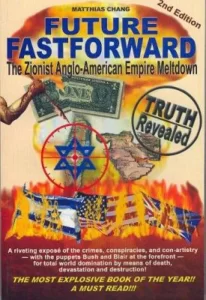
Challenging the Zionist-Anglo-American Empire
Chang raises provocative questions about the alliance between the U.S., the British Empire, and Israel, and the potential for a global “people’s war” against super-capitalists and their Zionist allies.
He does not shy away from controversial topics, exemplified by his involvement in a significant global media frenzy in 2003 when Dr. Mahathir Mohamad claimed, “Jews rule the world by proxy.”
Chang’s views represent a growing body of thought worldwide, challenging the ruling elite of the U.S.-British-Israeli axis.
Simplifying Complex Issues
Written in a reader-friendly style, Future Fast Forward simplifies complex global economic and political issues, making them accessible to the average reader.
Chang explains the interconnections of illicit drug economies, money laundering, and the banking networks they support.
Although originally intended for a Malaysian audience, the book’s powerful historical overview and analysis are highly relevant to American readers.
The Second Volume: Brainwashed for War, Programmed to Kill
In the second volume, Chang exposes how Americans have been brainwashed for war. From the Cold War to the War on Terror, Americans have been manipulated into supporting unnecessary conflicts.
The book documents atrocities committed by imperialist, Zionist-driven forces and reveals the propaganda, mind control, and brainwashing operations conducted by powerful intelligence services, including the Mossad, CIA, and MI6.
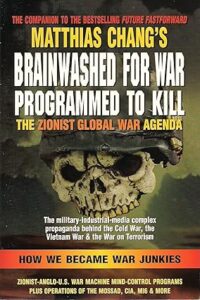
The Third Volume: The Shadow Money Lenders and the Global Financial Tsunami
The third volume may be Chang’s masterwork, predicting the recent global economic meltdown a year before it happened.
Chang’s financial forecasts, often at odds with mainstream economists, have been proven accurate repeatedly.
He explains the corrupt nature of the international money monopoly and the Federal Reserve’s role in perpetuating it.
This comprehensive overview of the global money scam is essential reading for understanding the manipulation of the world economy.

A Must-Read Trilogy
The Future Fast Forward trilogy is a history-making publishing venture that all Americans should read.
It offers deep insights into the forces that have led the United States into its current global quagmire and provides hope for a future where the New World Order intriguers can be brought to heel.
This trilogy runs parallel to other authoritative works shedding light on significant financial and political secrets of the 20th century, making it indispensable for those seeking to understand and challenge the global elite.
The Little-Known Saga of Ferdinand Marcos and the Hidden Treasure
Running parallel to Matthias Chang’s Future Fast Forward trilogy is another fascinating yet little-known book that uncovers one of the great financial and political secrets of the 20th century.
This story, shrouded in mystery, revolves around former Philippine President Ferdinand Marcos and the hidden treasure known as Yamashita’s Gold.
Challenging the Marcos Legend
In the mid-1980s, international correspondent Andrew St. George and a team of investigative reporters from The Spotlight newspaper, including Tom Valentine, challenged the mainstream narrative that Marcos and his wife Imelda had stolen billions from the Philippines’ treasury and U.S. foreign aid.
Nearly two decades later, veteran writer Sterling Seagrave confirmed their reports in his book Gold Warriors: America’s Secret Recovery of Yamashita’s Gold.
The Hidden Treasure
The Seagraves revealed the existence of a hidden cache of gold looted by Japanese warlord Yamashita Tomoyuki during World War II.
This gold was seized by American forces and used to fund the Black Eagle Trust, a covert operations fund utilized during the Cold War and beyond.
Marcos, who recovered a significant portion of this treasure as a young soldier, amassed wealth far greater than publicly acknowledged, making him one of the richest men in the world even before his presidency.

The Tentacles of Yamashita’s Gold
The implications of this treasure are vast, with its impact reaching the world’s biggest banks.
No American president has been unaware of this gold hoard, much of which remains hidden in the Philippines and the Pacific.
The Seagraves reported that even in 2001, associates of the Bush family were involved in treasure hunting efforts using U.S. Navy ships.
The Downfall of Marcos
Marcos’s vast wealth played a crucial role in his downfall.
When he demanded a higher commission for lending gold to the Reagan administration, then CIA Director William Casey orchestrated riots and protests in Manila.
Despite a last-ditch effort by high-ranking U.S. officials to persuade Marcos, he refused to capitulate.
Consequently, Marcos was ousted, exiled to Hawaii, and held under house arrest. The U.S. government confiscated billions in gold certificates from Marcos, claiming they were fake.
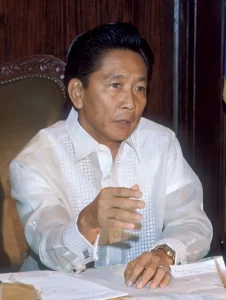
Behind-the-Scenes Intrigues
Marcos’s refusal to comply with international banking interests, particularly a demand from David Rockefeller’s Trilateral Commission, sealed his fate.
The Seagraves also exposed the involvement of the John Birch Society in attempting to market Marcos’s gold.
These deals fell through, and the Birchers, along with Congressman Larry McDonald, knew much about the Black Eagle Trust.
Unveiling the Truth
Gold Warriors is a thoroughly documented book, detailing the hidden history behind Marcos’s wealth and its global implications.
The Spotlight was the only American newspaper that reported on the intrigues leading to Marcos’s downfall.
After his ouster, Marcos granted The Spotlight exclusive interviews, underscoring the newspaper’s credibility.
The Role of the CIA
During this period, a CIA operative named Alan Foringer tried to uncover what The Spotlight knew about Marcos’s treasure.
His mysterious death highlighted the dangerous nature of these covert operations.
The book concludes by emphasizing the historical connection between war, money lending, and arms dealing, illustrating the intertwined nature of these elements in global politics.
A Revelation of Hidden History
Gold Warriors sheds light on the financial secrets and covert operations that have shaped modern history.
The revelations about Ferdinand Marcos and Yamashita’s Gold offer a deeper understanding of the forces at play behind global events.
This book is a must-read for anyone interested in the hidden aspects of international finance and political power.

Merchants of Death: A Timeless Examination of the Arms Industry
In 1934, H.C. Engelbrecht and F.C. (Frank) Hanighen published Merchants of Death: A Study of the International Armaments Industry, a book that remains as relevant today as it was at its release.
This controversial work delves into the role of major arms manufacturers and financial institutions in igniting World War I and setting the stage for World War II.
The Legacy of Frank Hanighen
Frank Hanighen, one of the authors, later founded the nationalist “conservative” newsletter Human Events.
Initially a platform for conservative nationalism, Human Events has since evolved into a voice for internationalism and neo-conservative war-mongering, a shift that would likely dismay Hanighen.
Sir Basil Zaharoff: The Mystery Man of Europe
One prominent figure in Merchants of Death is Sir Basil Zaharoff, a wealthy and powerful arms dealer dubbed “the mystery man of Europe.”
Zaharoff’s career is also the subject of Guiles Davenport’s book Zaharoff: High Priest of War, first published in the 1930s and republished in 2010.
This book inspired the title of The High Priests of War (American Free Press, 2003), which addresses modern neo-conservative war-mongers.
Zaharoff in Popular Culture
Zaharoff’s shadowy presence extends into popular culture.
He appears in the television miniseries Reilly: Ace of Spies, based on the career of Sidney Reilly, a Russian-born Jewish spy for British intelligence.
This drama highlights the high-level intrigues leading up to World War I and the Bolshevik Revolution.
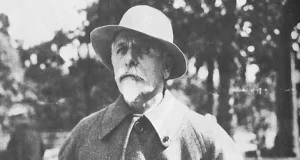
Impact on U.S. Policy: The Nye Committee
Merchants of Death played a pivotal role in prompting the congressional investigation led by Sen. Gerald Nye (R-N.D.) into the international arms trade.
The Nye Committee hearings were instrumental in the enactment of the Neutrality Acts, aimed at curbing American intervention abroad.
Despite these efforts, the isolationist policies ultimately faltered under pressure from internationalists who sought U.S. involvement in World War II against Hitler and Germany.
A Call to Awareness
Merchants of Death remains a significant work for understanding the intricate and often sinister connections between arms manufacturers, financial institutions, and global conflicts.
Its examination of figures like Sir Basil Zaharoff and its influence on U.S. policy highlight the enduring relevance of scrutinizing the forces that drive international warfare.
War Is a Racket: Major General Smedley Butler’s Legacy
Alongside Merchants of Death, another influential work that inspired Sen. Gerald Nye’s crusade against profiteering by arms manufacturers and money lenders is the legendary War Is a Racket by highly-decorated retired Marine Major General Smedley Darlington Butler.
This combative and colorful account, widely available on the Internet today, is essential reading and serves as a lasting tribute to Butler’s legacy.
Major General Smedley Butler’s Crusade
War Is a Racket is an unflinching critique of the military-industrial complex by one of America’s most decorated soldiers.
Major General Butler, known for his courageous service and two-time Medal of Honor recipient, turned his ire toward the profiteers of war in his later years.
His book exposes how wars are often waged for the benefit of financial and industrial interests rather than for noble causes.
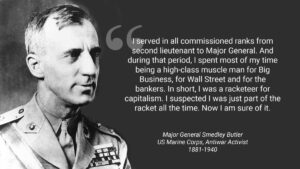
Butler’s Opposition to U.S. Involvement in World War II
In his final years, Butler was a vocal opponent of U.S. involvement in the war against Hitler.
This aspect of his legacy is frequently downplayed by those who celebrate his earlier military achievements.
However, Butler’s steadfast stance against American interventionism underscores his commitment to peace and his belief in the corrupting influence of war profiteering.
Essential Reading for Understanding War Profiteering
War Is a Racket remains a seminal work for anyone seeking to understand the dark side of the arms industry and the motivations behind war.
Butler’s candid revelations and passionate arguments make this book a timeless resource for advocates of peace and critics of the military-industrial complex.
A Timeless Call to Vigilance
Major General Smedley Butler’s War Is a Racket continues to resonate as a powerful indictment of war profiteering.
His fearless critique and unwavering opposition to unnecessary military intervention offer a crucial perspective on the forces that drive global conflicts.
This book, along with Merchants of Death, played a pivotal role in shaping Sen. Nye’s efforts and remains relevant in today’s discussions on war and peace.
